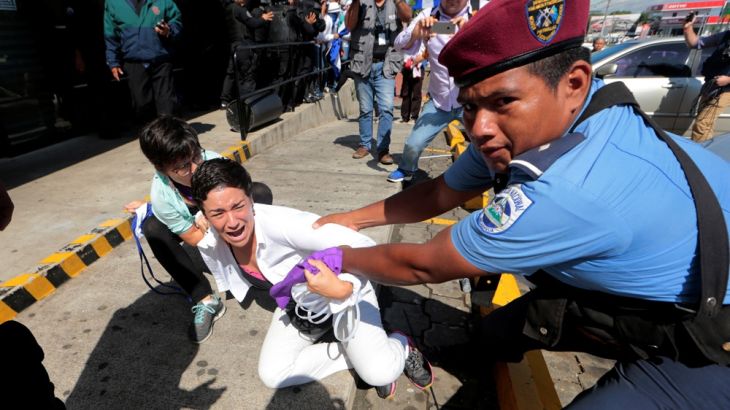Nicaragua police arrests anti-government protesters
Police arrest at least 26 people as it quashes protests against President Daniel Ortega.

Nicaraguan police have arrested at least 26 people after breaking up a group of demonstrators gathering for an anti-government protest on Sunday.
Police wielded clubs and hurled stun grenades at the crowd in a shopping centre car park in the capital, Managua.
Keep reading
list of 4 itemsUS House approves aid package worth billions for Ukraine, Israel
Will India’s election be free and fair?
Togo approves constitutional reform changing how president is elected
Men and women, some of them elderly, were beaten by police before being dragged down the street and loaded into police vehicles.
The demonstrations were part of an alliance of 40 opposition groups calling for President Daniel Ortega and his wife and Vice President Rosario Murillo to step down.
Since April, at least 300 people have been killed and thousands more injured in protests. The unrest was sparked by pension reforms, but developed into a wider anti-government movement.
“We’re being repressed, they won’t let us march, they’re violating our constitutional right to protest,” an elderly protester told Al Jazeera on Saturday.
“The whole thing is just terrible, the provocation against the people is too much. It’s too much … there has to be an end to this,” said another woman.
The demonstration was the first by an organised coalition of activists, calling themselves the Alliance for National Unity.
![Many of those taking part in Saturday's demonstration were women [Oswaldo Rivas/Reuters]](/wp-content/uploads/2018/10/b1319ac692354abfb406d17361903614_18.jpeg)
Hundreds of anti-riot police were deployed early on Saturday to key points in the capital, while government supporters – who are allowed to demonstrate – took over city roundabouts where protesters had planned to assemble.
Al Jazeera’s Manuel Rapalo, reporting from Managua said authorities had previously warned that any protests would be broken up by force.
“The Nicaraguan police had announced [on Friday] that any protest against the government today would be considered illegal and would not be allowed. Despite this, we’ve seen several people come out on the streets to protest the government.
“Police have started arresting, one by one, every one of the peaceful protesters. We are seeing tear gas being deployed against protesters and against the press. The press have been victims of harassment as well as attacks by the police today,” said Rapalo, who added that he and his producer had been hit with a tear gas canister.
Peaceful protest in #Managua met with force by police. Dozens of arrests already, police saying any protest against the government is illegal. Press is being harassed as well, we were targeted with flash grenades, my producer’s phone was crushed while she was recording. pic.twitter.com/ZxsKr57Om7
— Manuel Rapalo (@Manuel_Rapalo) October 14, 2018
Some reporters covering Sunday’s protests were also beaten and briefly detained by police, according to local media.
Journalism is an increasingly dangerous profession in Nicaragua, where reporters face harassment, assault and death threats.
Speaking to Al Jazeera on Wednesday, Miguel Mora, founder of 100% Noticias, a local TV channel, said being a journalist in Nicaragua today is “a matter of life a death”.
“We’ve been harassed, shot at, angry mobs sent by the government to intimidate us. At one point we were under siege, unable to leave the building for several days
At least one journalist has been killed so far and several foreign reporters have been deported.
The latest crackdown was criticised by both the Organization of American States (OAS) – of which Nicaragua is a member – and the president of neighbouring Costa Rica, where thousands have applied for asylum since the unrest began.
“We demand the government of Nicaragua release the protesters who have been detained, that it respect the right to peaceful protest nationwide, and stop repression and all intimidation of political leaders and civilians,” OAS chief Luis Almagro said on Twitter.
Costa Rican President Carlos Alvarado said he was “deeply concerned” by the arrests. “The repression the Nicaraguan people are being put through must stop,” he said in a statement on Twitter.